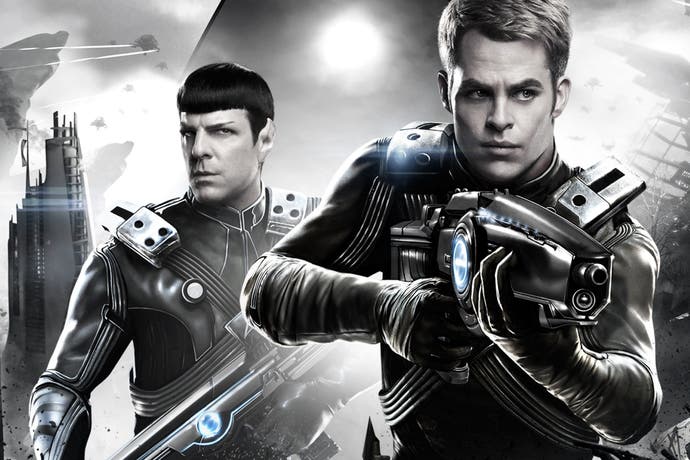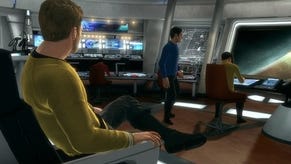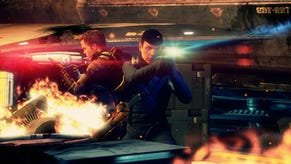Star Trek: The Video Game review
Where lots of games have gone before.
Star Trek doesn't belong in the modern games industry. Gene Roddenberry's idealistic space-faring parable was driven by big, heartfelt beliefs: multicultural co-existence, diplomacy, strategy and an unquenchable thirst to find new things and understand them.
As Captain Kirk, William Shatner may have conspired to remove his shirt at every available opportunity, and he was always ready with a phaser or a two-fisted punch, but Star Trek was never about action. Today's blockbuster games, however, are nothing but action. Headshots are simply easier to execute and market than negotiation.
How has developer Digital Extremes squared this circle? By taking a naval captain and a scientist and turning them into infantrymen. Purely from a military protocol point of view, that's all kinds of wrong.
The script, penned by God of War writer Marianne Krawczyk, goes a long way to compensating for this mistake. While the actions you're asked to perform never fit comfortably into Trek's footprint, the game still feels of a piece with the franchise thanks to strong writing and spirited voice work from the cast of J. J. Abrams' movies. Chris Pine and Zachary Quinto fit comfortably into their roles as Kirk and Spock respectively, and their banter shows that Krawczyk, at least, understands what makes these characters tick.
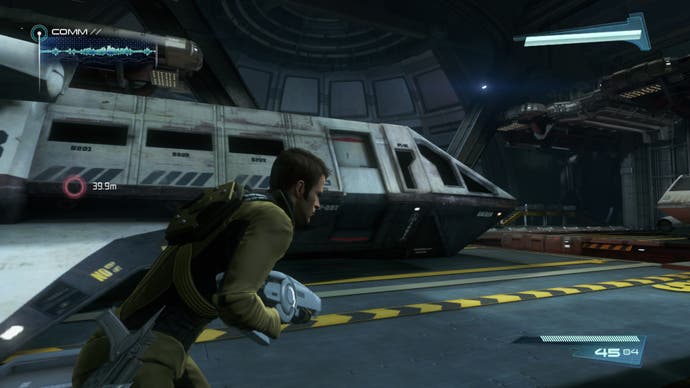
The plot finds the Federation under attack from a new menace: the Gorn. These reptilian aggressors are best known for their appearance in the original TV series, in which Kirk went mano-a-mano with a rubber-masked Gorn on a remote desert planet. The creatures have been given a rather generic slobbering monster makeover to better suit modern tastes, but their character remains much the same. There's no diplomacy, because it's hard to get through to a warmongering lizard who wants to kill everyone.
Playing as either Kirk or Spock, with the other role taken by AI or another player, you voyage from New Vulcan to the Gorn homeworld via stricken Starbases and the Enterprise itself. Regardless of the environment, enemies enter from one end, you enter from the other, and you each take cover and shoot at each other. The sight of Spock, hunkered behind cover and popping off shots from a railgun or wielding a shotgun, is constantly jarring, and the tug of war between our expectations of the Star Trek brand and the reality of the video games market is never convincingly resolved.
It's a pity, since the idea of a Kirk and Spock co-op game is actually rather inspired. It's their yin-and-yang relationship that defines Trek's heart: a man who is all instinct and a half-alien who is all intellect, stronger together than apart. That's a gameplay template ready to be used, but Star Trek: The Video Game's biggest stumble is to take these iconic and distinctive characters and flatten out their differences. Despite early talk of each having their own strengths, that hasn't translated into the finished product. Both are jacks of all trades, equally at home sneaking or shooting, and, in gameplay terms, these polar opposites are indistinguishable apart from the colour of their uniform.
The idea of a Kirk and Spock co-op game is actually rather inspired. It's their yin-and-yang relationship that defines Trek's heart
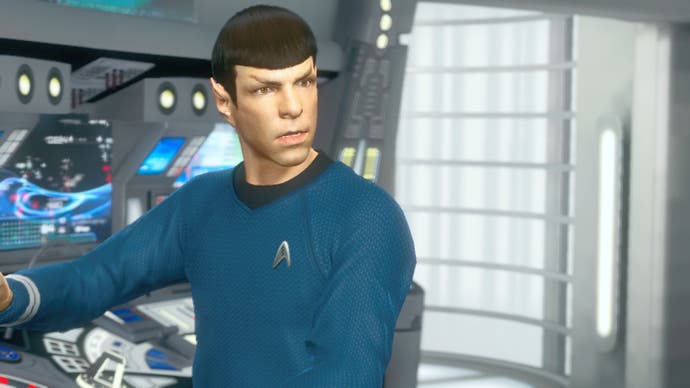
This flattening effect also seeps into the gameplay. There are vague stabs at alternate ways of playing, but all end up being subservient to the needs of the shooter. You can try to stealth your way through a section, but the game engine simply isn't up to the task. Movement is jerky, animation is glitchy and the AI - both friendly and enemy - is inconsistent enough to make any serious attempt at sneaking more trouble than it's worth.
Your AI partner will run headlong at an enemy turret, get shot down and then sit there in front of the gun asking to be rescued rather than shuffling to safety. Enemies will run right past you or else stay behind cover without moving. Characters are constantly getting stuck in weird animation loops or jamming on the scenery. Low-resolution textures abound and character models are stiff and puppet-like, with rigid faces that make a mockery of the actors' efforts. There's an alarming lack of polish for a game that's been in development for at least two years.
These are traits the game shares with Digital Extremes' Dark Sector, a very similar third-person shooter from 2008. However, where that game was ultimately sunk by its plodding structure, Star Trek often seems hyperactively determined to break up the corridor shooting with elements borrowed from other, better games.
There's a space battle that takes the form of a large-scale turret section as you shoot down enemy torpedoes and target their weak spots. There are numerous platforming moments that feel copy-pasted from Uncharted, where you cling and lurch your way from ledge to ledge. There's a level with underwater sections that make Lara Croft's much-derided aquatic moments look positively graceful. One stage finds Kirk and Spock teleporting each other past obstructions in a tag-team fashion. And there are many stages where you hurl yourself into space, dodging debris and obstacles as you're taken on a scripted aerial ride.
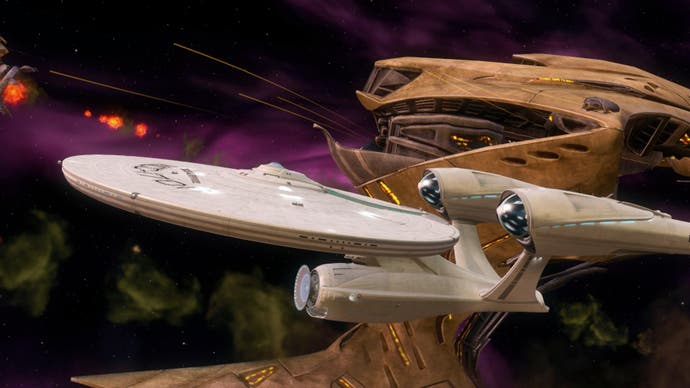
There's nothing wrong with these borrowed moments in principle, but none are ever fully developed and all suffer from clumsy execution where it's painfully obvious that the game engine is being asked to do things beyond the limits of its design. Rather than a welcome change of pace, such moments end up as clunky distractions. A sprinkling of mini-games, used to access or hack various systems, fare better but quickly become repetitive.
For all Star Trek's flaws, the combat itself can actually be pretty good. There are enough options open to you - mostly via your multi-faceted tricorder - to make shoot-outs different enough from the common shooter herd. Ferreting around might reveal vents or tunnels that will help you flank the enemy. You can hack their flying drones and make them fight for you, rewire turrets to open fire on their handlers and even jam enemy weapons or remotely detonate their grenades. In terms of co-operative moves, there are no specific two-player combat options, but you can boost your partner's shields and weapons to help them through tricky stages.
Such abilities are unlocked via a rudimentary XP system, earned by scanning objects of interest, finding the obligatory audio logs or hacking key systems. It's a bare-bones offering, with a couple of genuinely useful upgrades but nothing that really encourages the player to explore or experiment.
It all adds up to a game that is never as good as it should be, nor as bad as it often seems

This is true of the game in general. There are some potentially interesting ideas hidden in the margins, and some were hinted at during early previews, but all seem to have been brushed aside as the game zeroed in on the homogeneous form needed to fit into a AAA box in 2013. How interesting the combat becomes depends almost entirely on your willingness to shake things up by trying new things, as the game itself - both in mission design and AI - never demands anything beyond the most basic point-and-shoot tactics. Make the effort and the experience overcomes its creaky foundations. Left to its own devices, it's depressingly content to be played as a vanilla blaster.
It all adds up to a game that is never as good as it should be, nor as bad as it often seems. Too much of the game design is fighting against itself, with clever ideas subservient to generic structure, strong writing weighed down by clunky production, rich combat held back by execution that never dares ask too much of the player. It requires patience and forgiveness to find it, but the good stuff is worth the effort.
Star Trek fans are most likely to make that effort, but also most likely to be irritated by the liberties the game takes with its source material in order to squeeze itself into the cover-based shooter template. When the music soars, the characters align and the combat gels, Star Trek becomes a rare movie game that rises above its peers and delivers something genuinely fun. It's only ever a partial success though, too bogged down by timid design and technical rough edges to really be the game that Trek deserves.
